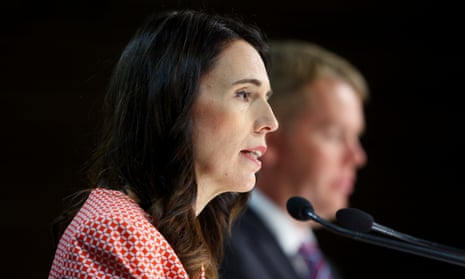Jacinda Ardern has said New Zealand and “the world” need to return to some semblance of normality before she opens the country’s borders to foreign nationals.
The prime minister shut the border in mid-March and said on Tuesday she would not open it again until New Zealanders were “vaccinated and protected” – a process that will not start for the general population until the middle of this year.
Ardern also cast doubt on the prospects for a travel bubble with Australia in the near future, and said she was “disappointed” with the Australian government’s decision to suspend quarantine-free access for New Zealanders for three days in the light of the case of community transition in Northland.
“New Zealand will only truly feel like it returns to normal when there is a certain level of normality in the rest of the world, too,” Ardern said at her first post-cabinet press conference of the year.
“But given the risks in the world around us and the uncertainty of the global rollout of the vaccine, we can expect our borders to be impacted for much of this year,” she said.
“For travel to restart, we need one of two things: we either need the confidence that being vaccinated means you don’t pass Covid-19 on to others – and we don’t know that yet; or we need enough of our population to be vaccinated and protected that people can safely re-enter New Zealand. Both possibilities will take some time.”
New Zealand citizens are able to return to New Zealand but they must quarantine in a government-managed isolation facility for two weeks, and return two negative tests, in addition to a negative test before they depart for New Zealand.
Some foreign nationals have been able to gain exemptions to re-enter if they have specialised skills that can’t be found locally, or are a family member or spouse of a New Zealand citizen.
“In the meantime, we will continue to pursue travel bubbles with Australia and the Pacific, but the rest of the world simply poses too great a risk to our health and our economy to take the risk at this stage,” Ardern said.
“Our team of five million worked too hard last year for us to risk any of the gains we have made. Health gains that see us going about our daily lives pretty much as normal, and saw the economy bounce back strongly from the initial shock.”
“We need to remain unified, we showed last year how good we are at that and that’s exactly what we intend and need to do for 2021.”
On Monday Australia suspended its quarantine-free arrangements with New Zealand for three days after a single community case of Covid-19 emerged in Northland, meaning New Zealanders arriving in Australia in that period would have to enter hotel quarantine for 14 days.
Ardern said she was “disappointed” with the Australian prime minister Scott Morrison’s decision, and she would need further assurances that “short-notice border closures” would not be a feature of the bubble.
The comments came after Australia’s health minister, Greg Hunt, played down any suggestion of a rift on Monday, saying Morrison had “a very productive and convivial conversation” with Ardern about the border decision.
Ardern offered assurances that the sole Northland community case was “well under control”, and said a country-to-country bubble with quarantine-free travel in both directions was now looking unlikely, as each Australian state had different regulations for managing the virus.
New Zealanders breathed a sigh of relief on Tuesday after no new cases of Covid-19 were found in the community, despite hundreds of Northland residents being tested on Monday after a woman became the country’s first case in months.
Fifteen of the woman’s 16 close contacts have tested negative for the virus, which health authorities believe was contracted from an infected surface at the Pullman hotel in Auckland while she was in managed isolation. She tested negative twice in isolation before being allowed to leave.
Covid-19 response minister Chris Hipkins said investigations were continuing into how the 56-year-old woman became infected while in government-managed isolation, but assuaged community concerns in Northland, saying Māori had been the most tested group since Sunday and that planned Waitangi Day celebrations were scheduled to continue.
